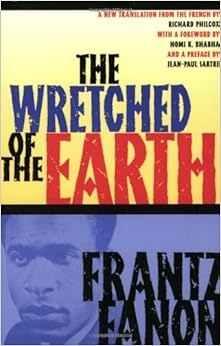I’ve just begun reading The Wretched of the Earth (1961) by the philosopher, psychiatrist and revolutionary, Frantz Fanon. As I’m reading it, I’m hearing the soundtrack for Straight Outta Compton in my head and thinking of Sandra Bland, Ferguson, Missouri and the #blacklivesmatter movement. This is powerful stuff.
As I said, I’ve just started reading – in fact, I’ve only read through the new forward for this edition (2004) by Homi K. Bhabha and the preface by existentialist Jean-Paul Sartre. And it is Sartre’s words that caused me to think of the #blacklivesmatter campaign. He may have been writing to Europeans in the latter end of the 20th century who struggled to understand the violent collapse of the French Algerian colony, but he might as well have been writing to white Americans struggling to understand the riots and marches and protests in places like Ferguson, Missouri – to me.
Read this:
“Europeans, open this book, look inside. After taking a short walk in the night you will see strangers gathered around a fire, get closer and listen. They are discussing the fate reserved for your trading posts and for the mercenaries defending them. They might see you, but they will go on talking among themselves without even lowering their voices. Their indifference strikes home: their fathers, creatures living in the shadow, your creatures, were dead souls; you afforded them light, you were their sole interlocutor, you did not take the trouble to answer the zombies. The sons ignore you. The fire that warms and enlightens them is not yours. You, standing at a respectful distance, you now feel eclipsed, nocturnal, and numbed. It’s your turn now. In the darkness that will dawn into another day, you have turned into the zombie.
“In that case, you say, let’s throw this book out of the window. Why bother to read it since it is not meant for us? For two reasons: first, because Fanon analyses you for his brothers and demolishes for them the mechanism of our alienations. Take advantage of it to discover your true self as an object. Our victims know us by their wounds and shackles: that is what makes their testimony irrefutable. They only need to know what we have done to them for us to realize what we have done to ourselves. Is this necessary? Yes, because Europe is doomed. But, you will say once again, we live in the metropolis, and we disapprove of the extremes. It’s true, you are not colonists, but you are not much better. They were your pioneers, you sent them overseas, they made you rich. You warned them: if they shed too much blood you would pretend to disown them; the same way a State – no matter which one – maintains a mob of agitators, provocateurs, and spies abroad whom it disowns once they are caught. You who are so liberal, so humane, who take the love of culture to the point of affection, you pretend to forget that you have colonies where massacres are committed in your name. Fanon reveals to his comrades – especially to those who remain a little too Westernized – the solidarity of the metropolitans with their colonial agents. Have the courage to read it, primarily because it will make you feel ashamed, and shame, as Marx said, is a revolutionary feeling. You see I, too, cannot lose my subjective illusions. I, too, say to you: “All is lost unless…” I, a European, am stealing my enemy’s book and turning it into a way of healing Europe. Make the most of it.” (xlviii – xlix)





No comments:
Post a Comment